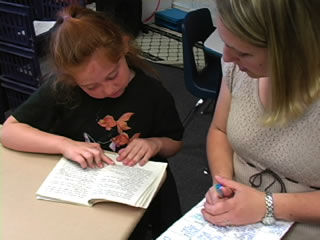Setting
Norms: Rituals and Routines to Support the Workshop Approach
I spend the first one and half to two months in readers and
writers workshop, doing just rituals and routines. In readers workshop,
we start off the year with mini-lessons on various topics (many
of which we remind ourselves of by using posters hung on our
walls):
- What
is a just-right book?
- How do you use a classroom library?
- How do you
come to the carpet?
- How can you be an active listener?
- What should student behavior be like in a one-on-one conference?
In writers workshop it would be:
- What is your notebook?
- What
is your green in-progress folder?
- How
do you write independently?
- What is a draft?
- What
does the word edit mean?
- How do you get help, without interrupting a conference?
- What
should student behavior be like in a one-on-one conference?
These are things that
if you’re
in a genre study, you have to have in place
if you expect it to run smoothly. I do occasionally
need to go back and touch down on these and revisit
these mini-lessons, but for the most part the first
six weeks is just establishing… it sounds so simple,
but, “How
do you come to the carpet?”, or “How do you sit
on the carpet? How do you listen during a read out loud? How
do you participate in an interactive read out loud?” these are things as second graders, they might not have ever
seen this before.
At my school, the
K and the first grade are doing a readers and writers workshop
as well. But we have a high mobility rate (close to 30%),
which has increased each year. So we have, for example
last year, 9 out of my 21 students had never attended Barrett
before. So,
I can’t depend on those kids who’ve been through,
to train them. They’re just too young. For me, when
we’re
doing the rituals and routines, we’re still doing work;
in writers workshop, they still produce a published piece after
we do the rituals and routines.
I call this time “Living the life of a reader, and living
the life of a writer.” I’ve found every year since I’ve
been doing readers and writers workshop, that these kids need
it revisited. Though
I can pick out the kids who’ve had it before, it’s
like the old saying, “If you give them an inch they’ll
take a mile,” so it really sets the tone from the
teacher to the kids, I feel.
In setting the tone for Readers Workshop, probably one of the
biggest influences for me was the book Reading
with Meaning;
there are lots of comprehension skills in there. We spend
a unit on connections, spend a unit on questions. If I notice
that my kids are just not able to identify story elements, then
I’ll switch it– I’m not
rigid in my teaching, I’ll say, they know how to make connections,
so I’m going to save that for maybe the end of the year,
and maybe I’ll just only do that for two weeks, because
they already have mastered that. When I return to a topic,
it's because I’d
like to see if they can do it on the book level that they’re
reading. So they might be able to make connections to my
read-out-louds, but can they do it on their own? I want
to make sure, I want to be confident when I say they get it.
 Living
the Life of a Reader and Writer
Living
the Life of a Reader and Writer